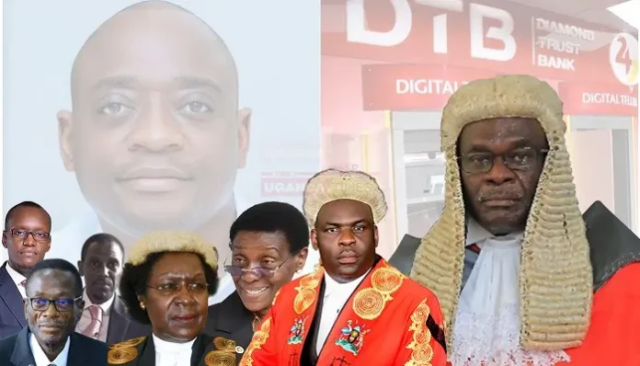
In what seems like a carefully orchestrated understaffing spectacular, the Judiciary has bid adieu to a handful of its members, leaving behind a scene that resembles a courtroom drama gone comically awry.
The cast of retirees includes none other than the distinguished Supreme Court Justice Ezekiel Muhanguzi, flanked by a cohort of High Court Judges, such as the illustrious Lady Justice Jane Kiggundu, the theatrical Asaph Ruhindi of the Industrial Court fame, the enigmatic Justice Joseph Murangira, and last but not least, the mysteriously named Justice Tonny Vincent Okwanga.
The grand farewell took place at a Dinner event held at the majestic Judiciary headquarters, where these legal luminaries exchanged their gavels for accolades and retirement certificates.
Deputy Registrars Sarah Ponye and Ayo Miriam Eddy Okello weren’t about to be outshone, joining the retiring parade alongside Chief Magistrate Moses Baligeya Mufumbiro, Grade One Magistrate Fred Gidudu, and a duo of Grade Two Magistrates, Tusiime Anania, Edephonese Rutajegwa, and Francis Ojikhan. With a supporting cast of 36 administrative staff also making their exit, the stage was set for an understaffed encore.
Deputy Chief Justice Richard Buteera, the evening’s unofficial master of ceremonies, paid tribute to the retirees with the poise of a Shakespearean actor, highlighting their unwavering commitment to a script that often involved more drama than a daytime soap opera. Buteera urged them to pen their escapades and legal musings into autobiographies, transforming their tales of justice into bedtime stories for future generations of law enthusiasts.
Reminiscing about the old days, Buteera recalled the times when paper was more precious than gold in the Judiciary’s coffers. He shared an anecdote of a journey where a judge had to forfeit a ream of paper in a cross-district paper relay, reminding everyone that even reams have their roadblocks.
Buteera’s tales of judicial misadventures included taxi rides with previously denied bail applicants, creating an awkward tango of recognition between judges and the judged, not to mention Justice Okwanga’s valiant attempt to prosecute a small village’s worth of individuals in a single day, proving that even superhero judges have their limits
In a dramatic twist, Buteera unveiled the Judiciary’s master plan: a transformation agenda that revolves around Alternative Dispute Resolution mechanisms, an ensemble cast including Mediation, Arbitration, Reconciliation, and even the dramatic Diversion in Juvenile Justice. Apparently, these new plotlines require seasoned actors, now free from the shackles of their robes, to embrace encore careers as mediators and negotiators.
Justice Asaph Ruhindi added his two satirical cents, reminding fellow judicial performers to keep their cool, as those who sit in judgment might just have an opinion or two about their performance. He extended a dramatic plea for the Judiciary to continue the camaraderie, even post-retirement, although a befuddling bureaucratic hiccup involving a visa recommendation signatory had him questioning the stage directions.
In the midst of the mirth, Lawrence Opolot Okim, a retiring driver who had chauffeured this legal troupe, made a rather insurance-based curtain call. He humorously suggested that it might be fitting for the same institution that safeguarded their legal exploits to perhaps extend the umbrella of insurance to cover their post-performance medical bills, which suddenly seemed to surge like a courtroom objection.
As the curtains drew to a close, the grand spectacle highlighted the peculiar spectacle of a justice system in flux. With retirement ages of 65 and 70 for High Court Judges and Supreme Court Justices respectively, the ball seems to be in the court of Chief Justice Alfonse Owiny-Dollo, who, with a nod to comedic timing, has been graciously petitioning the government for a five-year extension to the retirement playbill.






